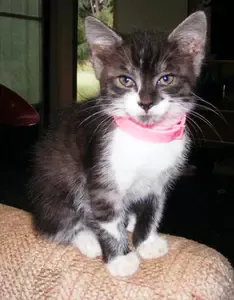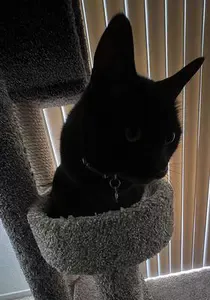Cat FAQ: Frequently Asked Questions
This cat faq is derived, in part, from some common questions I have received, either in person or via email. I'm also collecting questions that I see asked around the web, and I've put up some tips for new cat owners.
Cat care
Litter box
Cat health questions
General cat questions
Cat Care FAQ
- I recently heard about some pet food recalls. Where can I go to learn more about whether my cat is at risk or not?
Over the last 15 or 20 years, there have been several widespread recalls on pet food. Some of these have been devastating, causing serious illness and death in many pets.
My main sources of information for recalls are the US FDA, the ASPCA, news websites and television channels, and the pet food manufacturers themselves. Here's more information on staying updated on the cat food recall list. - I think my cat got into something. Is it poisonous? What should I do? Is there a number I can call?
You should keep your vet's emergency number handy, but for a suspected poisoning, the ASPCA has a poison control hotline.
To reduce the chance of poisoning your pet, keep all household products out of reach of your cat. - I want to get my cat's fur clipped, but I've heard it's not a good idea?
Generally speaking, it isn't. You might think your cat looks cute with a hair cut, or perhaps is too hot with all with that fur, but your cat may have a hard time regulating its body temperature with a significant amount of fur missing.
The "lion cut" is a grooming technique used on many cats, but it is not recommended. Unless there is a need, either for medical reasons, or your cat has gotten something in her fur and it is severely matted, I would not do this. - Should I feed my cat wet or dry food?
That depends. I used to prefer to feed dry food, free choice. Meaning that my cats can come back to the bowl whenever they like and eat.
This works well in single cat household, or a multi-cat household where all the cats are agreeable to sharing the same bowl. This isn't always the case, however, and there is increasing concern that dry food is linked to obesity in cats and feline diabetes.
Some vets will say that feeding dry food encourages the drinking of water, which is essential for good kitty cat health.
On the other hand, some experts have been known to say that the moisture that is in wet food can help with constipation issues, and also provide moisture to cats who are not big drinkers.
As we attempt to find the best cat food please take our cat food polls, and tell us your choice for...
Best dry cat food
Best canned cat food
Veterinarian Lisa A. Pierson explains why wet cat food is the only way to go. She also talks about animal versus plant proteins, so if you're thinking about a vegetarian diet for your cat, you'll want to read what she has to say. - Indoor or Outdoor?
Indoor cats are much safer and are not subject to the same perils as outdoor cats. The instance of cat parasites, such as worms (whether flea related or not), in outdoor cats is higher.
Outdoor cats can be attacked by other cats or animals that spread communicable diseases. In some areas, they are preyed upon by coyotes, birds of prey, or foxes.
With your cat indoors, there's no danger from automobiles, and no danger from other animals. The average life span of an indoor cat is much longer than that of an outdoor cat.
In any case, make sure you get your cat the vaccinations she needs against preventable feline illnesses.
Litter Box FAQ
-
Where should I place the litter box?
The litter box should be placed in a quiet, relatively low traffic area, but not in a remote area where your cat does not spend much time.
Ideally, the room should have multiple escape routes, and the box should be placed in such a way that no one can sneak up on her while she's "doing her business." -
I've heard I should have more than one litter box, is this true?
For a single cat household, with one medium sized cat, you can probably get away with only one litter box, but the recommendation is two.
For multi-cat household, the one plus one rule applies. One box for each cat in the house, plus one. -
My cat has stopped using the litter box, what should I do?
There are a number of reasons why your cat may have stopped using the box. The first step is to rule out any physical causes and treat them. The next step is to work on the behavioral issues that surround litter box problems. Inappropriate elimination is a common problem in house cats, and can be either behavioral or medical in nature.
There's a detailed section of the site on litter box problems which has possible causes, steps to take, and resources. It also includes stories submitted by other cat owners of problems and solutions for this condition. Here is a more extensive litter box FAQ, as well as stories from other readers who have had either urine problems or defecation problems with their cats.


Comments: What do you think?
Have your say about what you just read. Leave me a comment in the box below.